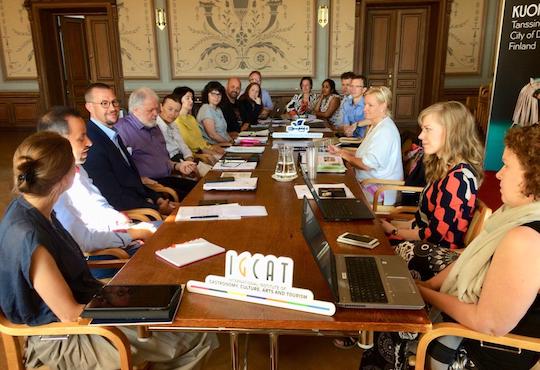Sustainability in its wider implications is clearly emerging as an important theme in the European Regions of Gastronomy with increasing commitments to drive forward key environmental policies.
This was demonstrated during the successful 17th European Region of Gastronomy Platform meeting held in Kuopio, European Region of Gastronomy awarded 2020, on 17-19 June 2019. The hosting region organised an exceptional programme for the Platform partners and offered them the opportunity to experience Kuopio region’s gastronomy, culture and well-being tradition through visits to local stakeholders.
Kuopio demonstrated innovative product initiatives based on principles of health, wellness and natural ingredients. Their main aim was to seek partners’ support in developing new experience-based initiatives and how to brand this niche travel communities.
Two new candidates for the European Region of Gastronomy 2022 title brought to the meeting a strong approach to sustainable food models and environmental protection: Menorca (Spain), which is a protected biosphere reserve, and Trondheim (Norway). The emphasis on green futures connected very well to the host region’s focus on developing well-being through reconnecting to nature.
Building connections and stories that generate interest in and about all the Regions of Gastronomy is an important strategy to enhance cross-marketing opportunities. Therefore, joint international projects providing visibility and giving strength to the regions’ quest to support their cultural and food diversity were discussed at the Platform meeting, including the European Young Chef Award, the Top Visitor Experience, the Food Film Menu and the Local Food Gift Challenge.
In particular, representatives from awarded and candidate European Regions of Gastronomy focused on a shared initiative to give value and visibility to local crafted food gifts, either authentic or innovative. The discussion concluded with an agreement on a pilot project. IGCAT will work closely with the regions to further define the criteria and procedures that can be applied in regions to support local producers and give added value to local initiatives.
Sibiu and South Aegean, European Regions of Gastronomy awarded 2019, presented their flagship activities for their title year, while Slovenia awarded 2021 explained their marketing and development plan for gastronomy tourism. Finally, Kuopio gave an overview of the activities they will carry out in 2020 and the local stakeholders involved.
About the European Region of Gastronomy
Candidate and awarded Regions of Gastronomy from Europe, guided by IGCAT, are working together to raise awareness about the importance of their cultural and food uniqueness and share the long-term aim to: promote a better quality of life in European regions; highlight distinctive food cultures; educate for better health and sustainability; nurture creativity; improve tourism standards; and stimulate gastronomic innovation.
About IGCAT
IGCAT aims to empower local communities by raising awareness of the importance to safeguard and promote distinct food, culture, arts and sustainable tourism assets. This is essential to balance against globalised food trends that are impacting on our planet, health and local economies.
IGCAT is a non-profit institute established in 2012, working with regional stakeholder consortiums in the fields of gastronomy, culture, arts and tourism. It counts on the expertise of a worldwide network of experts and works in partnership with specialised intergovernmental organisations.
IGCAT provides the Region of Gastronomy Award and is the official secretariat for the European Region of Gastronomy Platform. Furthermore, the Institute has developed the European Young Chef Award the Local Food Gift Challenge, the Top Visitor Experience and the Food Film Menu.
20 June 2019
